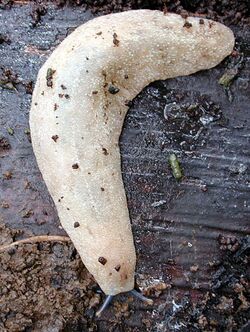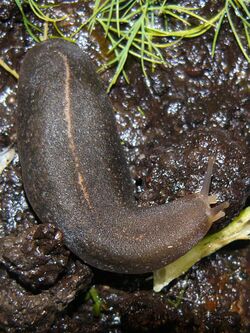Biology:Veronicellidae
| Leatherleaf slugs | |
|---|---|

| |
| Live individual of Veronicella sloanei | |

| |
| Live individual of Laevicaulis alte | |
| Scientific classification | |
| Domain: | Eukaryota |
| Kingdom: | Animalia |
| Phylum: | Mollusca |
| Class: | Gastropoda |
| Subclass: | Heterobranchia |
| Order: | Systellommatophora |
| Superfamily: | Veronicelloidea |
| Family: | Veronicellidae (Gray, 1840)[1] |
| Type genus | |
| Veronicella | |
| Genera | |
|
See text | |
| Synonyms | |
| |
The Veronicellidae, also known by their common name the leatherleaf slugs, are a family of pulmonate terrestrial slugs.
The herbivorous molluscs occur mainly in the tropical and subtropical areas of America, Asia and Africa.
They act as intermediate hosts of the rat lung worm Angiostrongylus costaricensis, and act as a vector for other human diseases.[citation needed] They also cause significant damage to crops.[2]
Description
The dorsal surface of these slugs is entirely covered by the mantle or hyponota. These mollusks have a posterior located anus, eyes on contractile (not retractile) tentacles, and no lung or pulmonary organ. In these aspects they are anatomically distinct from most other types of terrestrial slugs, which typically belong to the order Stylommatophora, and which have a forward located anus, and retractile tentacles.
The closely related members of the family Onchidiidae differ from the Veronicellidae by having a pulmonary sac, or lung.[3][4][5]
Distribution
Members of the family can be found in the Central African Republic, Kenya, Cameroon, tropical West Africa, Mexico,[6] the Democratic Republic of the Congo, Thailand, southern Asia, southern China, Taiwan, Cuba, the Highland Rainforests of Puerto Rico,[7] Florida, Dominica,[8] Hawaii,[9] the islands of the Indian Ocean, Australia, Samoa and Guyana.[10]
Life cycle
Some species of Veronicellidae bear live young.
Genera
The Veronicellidae family has no subfamilies (according to the taxonomy of the Gastropoda by Bouchet & Rocroi, 2005).
Genera within the family Veronicellidae include:
- Angustipes Colosi, 1922[11]
- Belocaulus Hoffmann, 1925[12]
- Colosius Thomé, 1975[12]
- Diplosolenodes Thome, 1976[11][12][13]
- Filicaulis Simroth, 1913[14]
- Heterovaginina[12]
- Imerinia Cockerell, 1891
- Laevicaulis Simroth, 1913[11][12]
- Latipes[12]
- Leidyula H. B. Baker, 1925[11][12][13][15]
- Phyllocaulis Colosi, 1922[12][15]
- Potamojanuarius Thomé, 1975
- Sarasinula Grimpe & Hoffmann, 1924[11][12][15]
- Sarasomia[11]
- Simrothula Thomé, 1975[12]
- Simrothula paraensis Gomes, Picanco, Mendes & Thome, 2006[16]
- Vaginula Fischer, 1871[17]
- Vaginulus Férussac, 1829[12]
- Veronicella de Blainville, 1817[11][12] - the type genus
References
- ↑ Gray J. E. (1840). Synopsis of the contents of the British Museum, ed. 42, p. 126, p. 149.
- ↑ "Research Institute of Organic Agriculture (FiBL), Frick, Switzerland". 2002. http://chapingo.crcnetbase.com/books/5275/DK6323ch219.pdf.
- ↑ "Palaeos Metazoa: Mollusca: Pulmonata: Systellommatophora". http://www.palaeos.com/Invertebrates/Molluscs/Pulmonata/Systellommatophora.html. Systellommatophora at Palaeos
- ↑ "Integrated Taxonomic Information System: Veronicellidae". https://www.itis.gov/servlet/SingleRpt/SingleRpt?search_topic=TSN&search_value=78765.
- ↑ "Univ. Michigan Animal Diversity: Veronicellidae". http://animaldiversity.ummz.umich.edu/site/accounts/classification/Veronicellidae.html.
- ↑ "A review of the Veronicellidae from Mexico (Gastropoda: Soleolifera)". https://www.redalyc.org/pdf/425/42578104.pdf.
- ↑ (in Spanish) Aguayo C. G. (1965). "Sobre el status de Veronicella portoricensis (Mollusca Pulmonata)". Caribbean Journal of Science 5(1-2): 25-28. PDF .
- ↑ Robinson D. G., Hovestadt A., Fields A. & Breure A. S. H. (July 2009). "The land Mollusca of Dominica (Lesser Antilles), with notes on some enigmatic or rare species". Zoologische Mededelingen 83 http://www.zoologischemededelingen.nl/83/nr03/a13
- ↑ "Comprehensive Report Species - Laevicaulis alte". http://www.natureserve.org/explorer/servlet/NatureServe?searchName=Laevicaulis+alte.
- ↑ Baker, H. Burrington (1926). "Veronicellidae from British Guiana". Proceedings of the Academy of Natural Sciences of Philadelphia 78: 29–34.
- ↑ 11.0 11.1 11.2 11.3 11.4 11.5 11.6 "Veronicellidae". Integrated Taxonomic Information System. https://www.itis.gov/servlet/SingleRpt/SingleRpt?search_topic=TSN&search_value=78765.
- ↑ 12.00 12.01 12.02 12.03 12.04 12.05 12.06 12.07 12.08 12.09 12.10 12.11 Thomé J. W., dos Santos P. H. & Pedott L. (1997). "Annotated list of Veronicellidae from the collections of the Academy of Natural Sciences of Philadelphia and the National Museum of Natural History". Proceedings of the Biological Society of Washington 110(4): 520-536.
- ↑ 13.0 13.1 (in Spanish) Pérez A. M., Sotelo M., Arana I. & López A. (2008). "Diversidad de moluscos gasterópodos terrestres en la región del Pacífico de Nicaragua y sus preferencias de hábitat". Rev. Biol. Trop. 56(1): 317-332,. PDF
- ↑ Wai Hoong, Ho (1995). "A Review Of The Land Snail Fauna Of Singapore". The Raffles Bulletin of Zoology 43 (1): 91–113.
- ↑ 15.0 15.1 15.2 Naranjo-García E., Thomé J. W. & Castillejo J. (2007). "A review of the Veronicellidae from Mexico (Gastropoda: Soleolifera). Revisión de los Veronicellidae de México (Gastropoda: Soleolifera)". Revista Mexicana de Biodiversidad 78: 41-50."
- ↑ "WoRMS : Simrothula Thomé". World Register of Marine Species. 1975. http://www.marinespecies.org/aphia.php?p=taxdetails&id=456517.
- ↑ Maceira F., David (2003). "Las especies de la familia Veronicellidae (Mollusca, Soleolifera) en Cuba". Rev. Biol. Trop. 51 (3): 453–461. http://www.ots.ac.cr/tropiweb/attachments/suppls/sup51-3%20malacol/18-Maceira-Especies-453-461.pdf. Retrieved 2 November 2012.[yes|permanent dead link|dead link}}]
- ↑ Smith (1876). "Vaginula rodericensis". World Register of Marine Species (WoRMS). http://www.marinespecies.org/aphia.php?p=taxdetails&id=214679.
External links
- Video of Veronicellid slug of Laos
- Slugs of Florida on the UF / IFAS Featured Creatures Web site
Wikidata ☰ Q3176669 entry
 |

